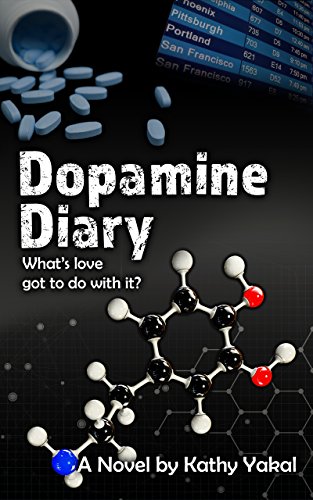A caveat upfront:
I’ve known Kathy Yakal for more than three decades. She is a good friend, a great wit and grand conversationalist, a fine and prolific nonfiction writer and technology journalist. So far as I know, she has never written fiction, or at least never published any.
Now she has.
Her first novel, Dopamine Diary, came out last year, but it’s not the sort of novel that dates. Yakal’s protagonist, Lisa, is a twenty-something working for a computer magazine in the latter 1980s—as did Kathy Yakal herself.
It’s an honest—and as a result harsh—look at a young woman’s struggles, challenges, and outright battles with both her mental illness and its consequences, and also an unflinching look at the reactions of friends, co-workers, lovers and loved-ones, medical professionals, well-wishers and otherwise.
It is not easy reading, and I’m not speaking of the prose, which is distanced and neutral throughout. Rather, the harshness of the book derives from Yakal’s unrelenting honesty in presenting the choices Lisa makes, and the consequences of those choices, some of which are devastating.
Among the devastations are the consequences and contraindications and complications of the meds Lisa takes, and the attitudes of those who prescribe them. Target the psychosis and let the patient deal with the depression her medications cause: Cheer up! You’re just a little down, that’s natural, you’ll get over it. That sort of thing, all too common in treatment then, and hardly rare today is handled bluntly and in the book.
At the heart of the novel—and for all its unsparing bluntness Dopamine Diary, like its author, does have a heart, and a large one—is Lisa’s long wrestle with the question of choice itself: whether to take or leave meds, whether to seek different treatment and what kind, whether to stay in relationships (both marital and adulterous), and more.
Every choice any of us makes is a junction of possibilities opened and possibilities closed-off, of course. But for Lisa, cycling among the various states of mind manifested by her illness, crossroads of possibility are also minefields, not all of which Lisa navigates successfully. As Yakal shows Lisa’s ability to navigate them differs, and drastically, from the approach to minefields (we all have them) made by those not dealing with mental illness.
We’re all confronted with choices, of course. But one of the larger gifts of Yakal’s novel is her presentation of the ways in which Lisa’s state(s) of mind compromise her ability to trust the decisions she makes (not that she necessarily knows this at any given time). This is what makes the book difficult to read—and not in a bad way. Fiction should be challenging, and Yakal’s is. We cringe—and on occasion gasp—at some of the decisions Lisa makes. But when we do we should also remind ourselves that if Yakal didn’t look away when writing those scenes, and clearly didn’t, then neither should we.
There is courage in the openness of Yakal’s approach, but not luridness. This is not a sensationalist novel—there are no cheap thrills here. Only expensive—in every sense—lessons, nearly every one of them learned the hard way, and some learned in the hardest ways imaginable.
But Lisa does learn them, however much she may curse the lessons that won the knowledge.
Dopamine Diary is not a polished novel, nor in some ways do I think it could have been. It’s very much a first novel and that, along with the nature of Lisa’s life and mental state, makes much of the book a cascade of rough edges and raw observations. I don’t think this is a bad thing, much as I would love to have seen Yakal put the book through another draft.
But if she had it wouldn’t be the same book, which is finally both novel and testament, and rewarding in both identities. A note at the end of the book tells something of its interesting history.
Before that, though, comes the novel’s closing lines, a a five-word couplet so perfect—and so perfectly transcendent and, again, devastating at exactly the same time—that it’s impossible to imagine Lisa’s story ending any other way, or with any other or any more words.
Kathy Yakal has a thoughtful and ongoing blog that deals with many of the issues her novel explores. She continues to write, and write well on business technology and related subjects.
I hope she’ll write more fiction—I’d like to see another novel from her.


